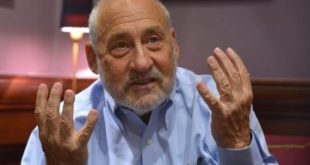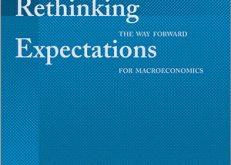Guest post by Jeff Mosenkis of Innovations for Poverty Action. In The New Yorker, John Cassidy reviews a new free online open-source economics textbook, The Economy. From an international collaboration of economists, it focuses on newer, post-financial crisis ways of thinking about and teaching economics. Case Western economist Justin Gallagher documents the bizarre fight he went through to get one research group at the University of Texas to turn over the public state data set it...
Read More »Just a Couple More Things on Price Gouging and Then I’ll Shut Up (For Now)…
[unable to retrieve full-text content]Just a Couple More Things on Price Gouging and Then I’ll Shut Up (For Now)…: Shutting up about price gouging for a while now for the sake of my own sanity. :)
Read More »Where modern macroeconomics went wrong
Where modern macroeconomics went wrong DSGE models seem to take it as a religious tenet that consumption should be explained by a model of a representative agent maximizing his utility over an infinite lifetime without borrowing constraints. Doing so is called micro-founding the model. But economics is a behavioral science. If Keynes was right that individuals saved a constant fraction of their income, an aggregate model based on that assumption is...
Read More »Rethinking expectations
The tiny little problem that there is no hard empirical evidence that verifies rational expectations models doesn’t usually bother its protagonists too much. Rational expectations überpriest Thomas Sargent has defended the epistemological status of the rational expectations hypothesis arguing that since it “focuses on outcomes and does not pretend to have behavioral content,” it has proved to be “a powerful tool for making precise statements.” Precise, yes, but relevant and...
Read More »Elon Musk auto-magically extends the battery life of Teslas in Florida to help drivers evacuate
price discrimination: n. the action of selling the same product at different prices to different buyers in order to maximize profits. This is, of course, the definition of price discrimination that I give to my classes. In practice, however, this notion of “same product” isn’t quite as simple as us instructors would have you believe. (Is anything ever, really?) We know that early-bird discounts at restaurants are generally considered price discrimination, as are higher prices for airline...
Read More »What makes economics a science?
What makes economics a science? Well, if we are to believe most mainstream economists, models are what make economics a science. In a recent Journal of Economic Literature (1/2017) review of Dani Rodrik’s Economics Rules, renowned game theorist Ariel Rubinstein discusses Rodrik’s justifications for the view that “models make economics a science.” Although Rubinstein has some doubts about those justifications — models are not indispensable for telling good...
Read More »I’m now officially fighting a war against bad climate…
[unable to retrieve full-text content]I’m now officially fighting a war against bad climate change logic in all forms.
Read More »One of the main topics in organizational economics (and…
One of the main topics in organizational economics (and economics in general I suppose) is the principal-agent problem- i.e. the misalignment of incentives between one party and another party enlisted to do the first party’s bidding. For example, a small-business owner hires an employee to run things and maximize profit for the owner, but a self-interested employee who is paid a fixed salary would likely rather check Facebook then do whatever it is that would be in the owner’s best interest....
Read More »Economic ideology
La force de l’autorité scientifique, qui s’exerce sur le mouvement social et jusqu’au fond des consciences des travailleurs, est très grande. Elle produit une forme de démoralisation. Et une des raisons de sa force, c’est qu’elle est détenue par des gens qui ont tous l’air d’accord entre eux — le consensus est en général un signe de vérité. C’est aussi qu’elle repose sur les instruments apparemment les plus puissants dont dispose aujourd’hui la pensée, en particulier les...
Read More »Causal Friday: The Most Depressing Instrument Ever, Fox News Edition…
On Fridays, we examine a research paper that uses (or fails to use) a clever method to perform causal inference, i.e. to tease out cause and effect. Economists Gregory J. Martin and Ali Yurukoglu have a new paper published in the American Economic Review (also available in working paper form here) that shows that the existence of Fox News has a (statistically) significant impact on Republican vote share. Here’s the abstract:We measure the persuasive effects of slanted news and tastes for...
Read More » Heterodox
Heterodox





